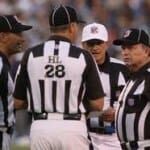First, it’s not the QB, a kicker, or even a lacrosse goalie. The toughest position is not only stressful and demands thick skin, but it is completely thankless; it’s the referee. Think about it, the best officials are invisible, because they only warrant consideration when something bad has happened. Nonetheless, the best games possess a flow, fairness, and game management only available through the toughest position on the field.
In addition, we all have to be officials at certain points on our own team or career. Interviewing the toughest of toughest positions on the field (SEC football officials) has revealed three keys for all of us to follow:

1) Get excited, not nervous-
Prior to a game, referees get the same type of feelings and thoughts as the players. The best get excited rather than nervous and the difference rests in how they perceive the situation. They must view games as “we get to call a good game,” rather than “I hope I don’t mess up a call.” It’s the same in our own lives, when we get excited; we view things as challenges (something we get to do) rather than threats (something bad can happen).
2) Communicate-
Since the game has changed in 20 years from big guys or fast guys, to big and fast guys, there are more “gut” or “marginal” calls on the field.
The head official is only one addressing the crowd at the game, so he must administer the call not only correctly, but also timely. When you see the referees gather together, it may even come down to the head official’s decision to make the call.
3) Re-focus-
There are approximately 170-180 plays in a game and referees never call a perfect game. The officials focus on their preparation, rely on their mantra of “ready, every play”, and the pre-snap routine. Every official has a different role on the field, so each person goes through a specific mental checklist that helps them focus.
However, mistakes still happen. Thus, some of the referees actually have a physical re-focus cue to help them on the most important play; the next play. When something goes poorly in your own life, what is your re-focus cue?
Dr. Rob Bell is the author of Mental Toughness Training for Golf, an AASP certified Sport Psychology consultant, and caddy on tour. He consults with athletes, coaches, and teams at all levels helping build and enhance their own mental toughness. His website is www.drrobbell.com and you can find him on Twitter @drrobbell
